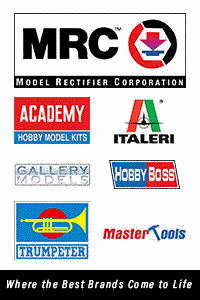
Academy/MRC 1/48 KV-107-II-5 JASDF 50th Anniversary 'White Heron' Kit First Look
By Michael Benolkin
| Date of Review | July 2014 | Manufacturer | Academy/MRC |
|---|---|---|---|
| Subject | KV-107-II-5 JASDF 50th Anniversary 'White Heron' | Scale | 1/48 |
| Kit Number | 12205 | Primary Media | Styrene |
| Pros | Interior and exterior fuselage are separate parts, excellent detailing | Cons | Nothing noted |
| Skill Level | Basic | MSRP (USD) | $52.00 |
First Look
 |
 |
 |
 |
 |
The KV-107 started life as Boeing Vertol Model 107 which was a twin-rotor, twin-engine design that first flew in April 1958. The US Army initially evaluated and rejected the aircraft but USMC adopted the 107 with equipped with larger engines which became the CH-46 Sea Knight. Japan was interested in the Model 107 for service in its Self Defense Forces and Kawasaki Heavy Industries acquired a license to manufacture the aircraft in Japan. The JMSDF acquired the KV-107-II-3 as a mine sweeper; the JGSDF selected the KV-107-II-4 as its assault and transportation helicopter; while the JASDF adopted the KV-107-II-5 as its primary rescue helicopter.
Ten years ago, Academy/MRC released the first styrene kits of the CH-46 in 1/48 scale starting with the CH-46E and followed up with the CH-46A/D. The kit goes together very nicely as you can see in our build review here. In 2005, Academy/MRC released the first styrene KV-107 kit and now that it is available again, I thought we'd take another look.
The kit molded in light gray styrene and features finely scribed details on the exterior. Supplied on five trees, plus a single tree carrying the windscreen and canopy, the kit is beautifully detailed. While most of the kit parts are common with the CH-46A/D release, this kit has the larger sponsons of the KV-107. The cargo compartment interior walls do have some visible ejector pin marks, though the majority of them are not viewable after assembly.
Construction begins with the rotor heads and as with the CH-46E kit, assembly is quick and straightforward. You'll need to drill out certain holes in the fuselage to facilitate installation of the towel-bar antennas and spotlights.
The interior cargo compartment is nicely done. You have choices to install troop seats, stretchers, or just leave it empty to haul cargo. A full set of stenciling is provided for the interior as well as the exterior to provide the requisite look of the aircraft. The designers did a nice job on this kit as there is a separate ceiling and floor for the cargo compartment, so you won't be seeing into the caverns of the rotor masts. Good show Academy!
Oh yes, after all of that detailing in the cargo compartment, there is also the cockpit which is also nicely represented, though the instrument panel as well as upper and lower center consoles are represented as decals. You won't be able to see much of any superdetailing in the cockpit through the windscreen and side windows so the decal approach will suit most builders.
Of course, after spending so much time in the cargo compartment, you're probably wondering if it will be seen after completion. The side crew entry door is positionable open or closed. The rear ramp and door are also independently positionable so you can portray the aircraft loading or unloading on the ground, open in flight, or all buttoned up. Again, you can see an example in our build review.
Markings are provided for two aircraft:
- KV-107-II-5, 04-4852, Hamamatsu Air Rescue Sqn, 2004 'White Heron' special paint scheme
- KV-107-II-5, 24-4832, Hamamatsu Air Rescue Sqn, normal paint scheme
This is the first time the KV-107 has been rendered in 1/48 scale and is just as nice as the CH-46 that preceded it. There are no challenging steps presented in the instructions, so I can recommend this kit to builders of all skill levels as long as this isn't one of the very first kits you've attempted.
My sincere thanks to MRC for this review sample!







